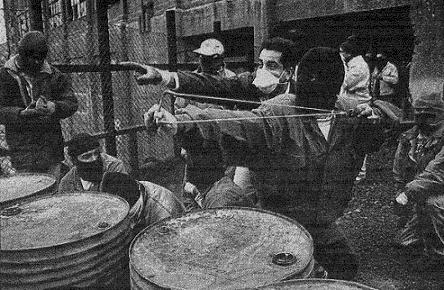
In the 1990s the global anarchist movement was facing increasing relevance and prestige in relation to a plethora of new social movements (some, truth be told, not so new) in the United States and abroad. This was best observed in a sequence of anti-globalization protests that reached their zenith in 1999’s “Battle of Seattle” and nadir in the wake of Carlo Giuliani’s death in Genoa in July, 2001. By the time of the Islamist terrorist attacks of September 11, 2001, sporadic and poorly-attended demonstrations persisted in the U.S. and Europe but the movement was essentially stopped dead in its tracks. For example, the protests against the World Economic Forum in New York City February 2, 2002, paled in comparison with previous demonstrations. While those within the movement readily blamed exogenous factors for the movement’s decline—9/11, creeping “fascism” and government crackdowns, etc.—few were willing to address endogenous ones.
Something that became apparent to me, as a participant and activist over the years since the terrorist attacks, is immensely unfortunate. At the risk of over-simplification, it seems to me that most left libertarians allow a vague left-wing anti-imperialism to trump any sort of rigorous libertarian anti-totalitarianism. What does this mean and why does it matter? It means that individuals, organizations and publications that should know better side with totalitarian movements against liberal capitalist regimes. This is a recurring theme so it’s instructive to point out incidences in the past which will be familiar to most libertarian leftists, the Russian, Spanish, and Cuban Revolutions.
After the Bolshevik Revolution in 1917, left-wing activists and authors flocked to the insurgent Soviet Union to view the accomplishments of the revolution first-hand. John Reed is the most well known but numerous authors, intellectuals and journalists made their way to the USSR. Anarchists, slowly but surely, crafted a cogent critique of communist totalitarianism. The first-hand experience of life under communist rule, as penned by revolutionaries like Vsevolod Mikhailovich Eichenbaum (better known as “Volin“) as well as one-time fellow-travellers like Alexander Berkman and Emma Goldman led many anarchists to make an about-face in their assessment of the Bolshevik government. Emma Goldman and Alexander Berkman both penned numerous articles, pamphlets and books decrying the emergence of a totalitarian regime in Russia (Goldman’s My Disillusionment in Russia was published in 1923, Berkman’s The Bolshevik Myth in 1925).
A similar process occurred during the Spanish Civil War. Duped again by the grandeur of revolution, Cenetistas—termed “anarcho-Bolsheviks”—adopted authoritarian methods against their fellow workers. Later, their erstwhile communist allies would have the anarcho-syndicalists detained, imprisoned and shot.
Again, after the Cuban Revolution in 1959, many anarchists in the United States praised the July 26 Movement. A few mavericks like Sam Dolgoff, not coincidentally actually in contact with the Cuban libertarian movement, tried to bring attention to this contradiction to no avail. In the last case, under the influence of emerging anti-colonialist movements in the developing world and their protégés in the U.S. like the Black Panther Party, American anarchists derided Cuban libertarians as stooges of imperialism and the C.I.A. Dolgoff was that rare voice that stood with the Cuban anarchists, pointing out that Che Guevara and the revolutionaries the New Left lionized were responsible for decimating the democratic and libertarian left after the triumph of the revolution.
In short it seems that left anarchists are doomed to repeat the same mistakes—albeit in different places and contexts—time and time again. This need not be the case. However, as long as anarchists view liberal capitalist states as a greater foe than totalitarian movements, I’m afraid this sorry state of affairs will continue to play itself out again and again.
Two authors who used to be popular with anarchists—not sure if they are anymore—are George Orwell and Paul Avrich. During WWII (after the Spanish Civil War) when faced with communist and fascist totalitarianism Orwell went to work in the British intelligence services. In a similar fashion, historian Paul Avrich worked for military intelligence after WWII. Avrich actually received the highest military decoration given to non-combat officers for his efforts in identifying the number and type of every Soviet aircraft in Europe. In other words, both not only supported liberal capitalist regimes in the struggle against totalitarianism, they worked for the state, for the military no less. The decisions they made are viewed negatively by most leftist anarchists today. Most see capitalism as a greater threat to libertarians than totalitarianism. I don’t. I think both Orwell and Avrich did the right thing given the circumstances and the nature of Stalinism. They did not think neutrality in the face of totalitarianism was an option, let alone actually siding or befriending totalitarians against liberal capitalist states.
It is a huge mistake for libertarians to align themselves with dictators. First and foremost because of the threat they pose to libertarians and libertarian movements but also because they stand diametrically opposed to everything libertarians are supposed to stand for. This is not to argue that liberal capitalism is the end all, be all. However, liberal capitalism at least provides the opportunity for the construction of that free space that libertarians strive to provide as an example of building a new world in the shell of the old, to borrow that wonderful I.W.W. slogan. Liberal capitalism provides the potential to start a revolutionary-syndicalist local, infoshops, and other counter-institutions that many libertarian socialists view as necessary.
A small segment of the libertarian left thinks this is a false dichotomy. You can read their perspectives here and here.